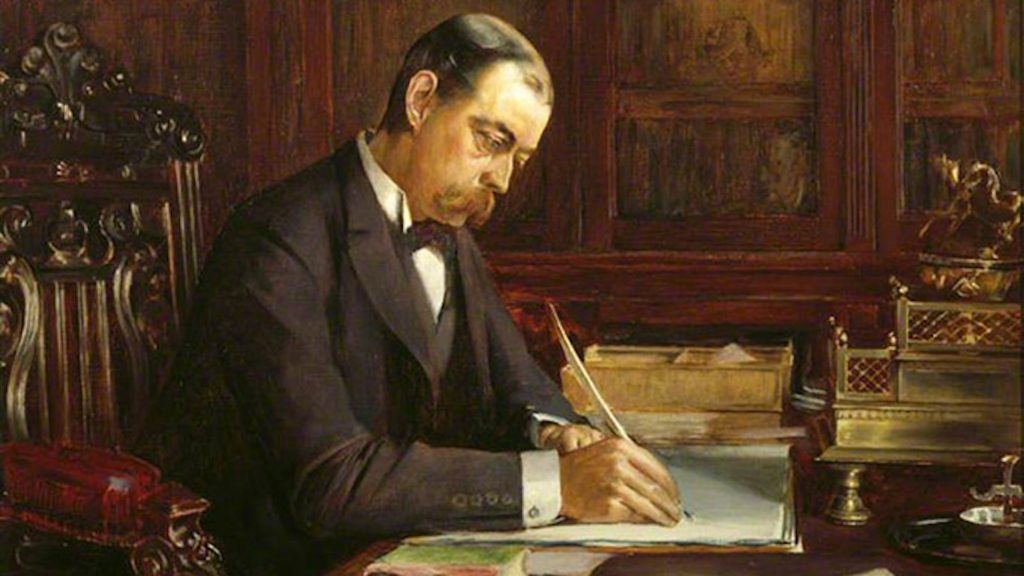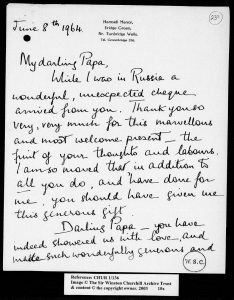
Bulletin #163 — Jan 2022
Lord Randolph’s Illness

Lord Randolph Churchill © National Trust, Chartwell; Supplied by The Public Catalogue Foundation
December 30, 2021
New Medical Research Reaches Strong Conclusion
What killed Winston Churchill’s father Lord Randolph? The question has long vexed the world of Churchill studies. Different conclusions have been reached, but a new paper by Andrew W. Ellis, Emeritus Professor of Psychology at the University of York, presents a deeply-researched study that helps to explain the confusion that has prevailed while also presenting its own definite conclusion. The full paper may be READ HERE, while a summary is presented below.
Lord Randolph Churchill died 127 years ago this month on 24 January 1895. Prof. Ellis concludes that the death almost certainly resulted from the effects of syphilis. He makes the following important points:
1—Lord Randolph’s doctors all agreed that he suffered from what was then called “general paralysis of the insane” or simply “general paralysis,” a common malady in the nineteenth century.
2—Two Danish doctors theorized as early as 1857 that general paralysis was the result of third-stage (tertiary) syphilis, but initially this theory was largely rejected by the medical community.

2024 International Churchill Conference
3—When Lord Randolph was dying in 1894–95, medical consensus still rejected the syphilis theory, which is why Lord Randolph was never treated for the disease according to the surviving records of his doctors. The dominant medical view at the time held that general paralysis was due to factors such as overwork and exhaustion. Consequently, there was no stigma attached to stating this as the cause of Lord Randolph’s death.
4—Within twenty years of Lord Randolph’s death, new evidence had emerged that caused the medical community to reverse itself and agree that general paralysis was undoubtedly the result of syphilis.
5—General paralysis became quite rare after the development of antibiotics in the twentieth century that treated syphilis in the early stages.
6—Ellis considers but then takes apart and rejects the alternative theory that the cause of Lord Randolph’s death might have been a brain tumor.
Everything known about Lord Randolph’s condition and behavior in his final years is consistent with tertiary syphilis. The fact that he was not treated for the disease, however, has been advanced in the past as evidence that this was not the true source of the problem. Clearly, though, if doctors at the time did not believe syphilis was the cause, they would not have treated their patient for it.
The fact that the medical community did a complete u-turn on the subject by 1915, when Winston was still a young man and his mother still very much alive, would explain why the two of them would have had—to the extent that we know what they did think—changing views on the subject that could appear confusing and conflicting to researchers of a later era.
In response to the findings of Prof. Ellis, International Churchill Society President Randolph Churchill said that “as a family we welcome high-quality research on this subject within a medical context. Certainly my great-grandfather Sir Winston believed his father had died of syphilis, and his daughter Mary Soames repeated the same belief although other members of the family disputed it.”
Independent of Prof. Ellis, a study into the same subject is now being conducted by Allister Vale and John Scadding, the authors of the definitive 2020 study Winston Churchill’s Illnesses. The results of that investigation, which are expected later this year, will also be reported by the Churchill. Bulletin.
Subscribe
WANT MORE?
Get the Churchill Bulletin delivered to your inbox once a month.




